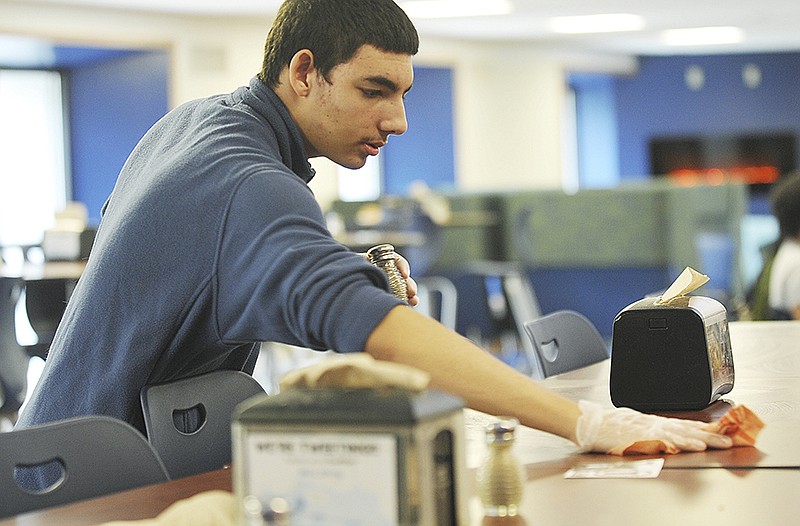When a student has struggled in regular education classes but is high functioning, it might be difficult to create a plan for his next step in life.
A new program at Jefferson City High School is helping eligible students with that transition through Project SEARCH. By partnering with specialist agencies, seven students this school year have been gaining work experience at Lincoln University.
Missouri Vocational Rehabilitation and the Missouri Rehabilitation and Employment Group have helped assess the students' potential skill acquisition to place them in appropriate work settings and to guide them through the workplace learning process.
The Missouri Department of Elementary and Secondary Education (DESE) connected the local school with a license with Project SEARCH. Missouri Department of Mental Health and the Cole County Residential Services Inc. have brought their resources to the table, too, especially for the students who are age 18 and older.
The seven students have worked at three experience rotations on the Lincoln campus since October, gaining skills at the library, cafeteria, office of student activities, and building and maintenance.
Project SEARCH was brought to JCHS last spring by DESE with Gov. Jay Nixon preferring a state agency be involved. On Monday, the partnership program was established firmly with the signing of a memorandum of understanding between the seven public agencies.
Eligible students typically have an Individualized Education Plan (IEP), are in their last year of high school eligibility and have significant intellectual or developmental disabilities.
The goal of Project SEARCH is for these students to achieve competent employment, said Laura Anderson, department chairman and teacher, as well as coordinator for JCHS Project SEARCH.
Part of the IEP process is to develop a plan for the student after high school. Sometimes students go to a trade school. But for a few, they may not realize they can hold productive employment part time and still qualify for government disability assistance, Anderson said.
Project SEARCH is designed to expose students to a broader world of opportunity and challenge them with higher expectations. The program benefits parents, too, who may be worried about how their child and his disabilities might be received in the work world.
The national program began in 1996 at Cincinnati Children's Hospital Medical Center when they chose to fill entry-level jobs with qualified people with disabilities. Today, Project SEARCH programs are in 300 sites in 43 states and four countries.
Similarly, Lincoln University immediately responded when the high school asked it to be involved, said Gretchen Woods, disabilities services coordinator. Between the school's mission statement's encouraging diversity and its priority to collaborate with the city, "it was a perfect fit," she said.
This first year, about five campus departments were involved. But after getting to know the Project SEARCH students, several other departments have asked to be included next year, like agriculture and athletics, Woods said.
Having Project SEARCH students on campus also creates more awareness of diversity and opportunities for college students to be inclusive, Woods noted.
Since October, the Project SEARCH students become a staple on the Lincoln campus, as people interact with them on a daily basis, said Chief of Staff Jerome Offord Jr. In the last six months, the high schoolers have grown from shy and unsure to accomplished and jovial, he said.
The students gain pride and self-esteem, Anderson said.
"We want them to be self-sufficient as much as they can, and so many are capable," Anderson said.
Barb Gilpin, DESE assistant director, said she has hoped for a Project SEARCH site in Jefferson City and believes this could become a national model.
"Isn't it amazing what collaboration can bring about?" said Lincoln University President Kevin Rome.
As a community issue, Anderson said she hopes to see more able students find meaningful employment after high school. She said she hopes local employers will consider hiring Project SEARCH students and others who may have disabilities but also can contribute to society.
The project partners currently are seeking student applicants for the 2015-16 school year. Email [email protected] for more information.

